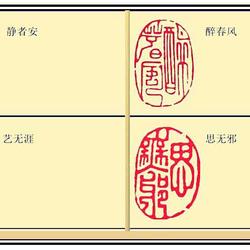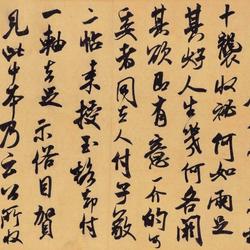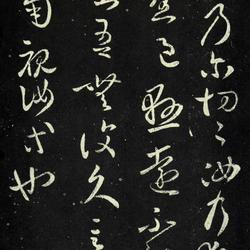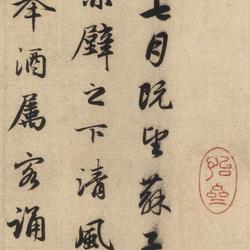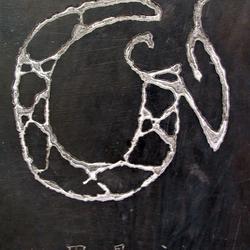Zhu Yunming's "Cursive Script Poems"
【Name】Cursive poetry calligraphy
【Category】Cursive calligraphy
【Author】Zhu Yunming
【Form】Paper
【Era】Ming Dynasty
[Original size] 36.1cm in length, 147.5cm in width
[Current Situation of Cultural Relics] Taipei National Palace Museum
"Cursive Poems"
Part One: Overview of "Kong Hou Yin"

Details of "Honghou Yin":
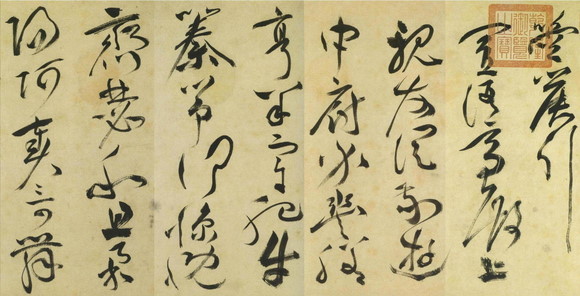
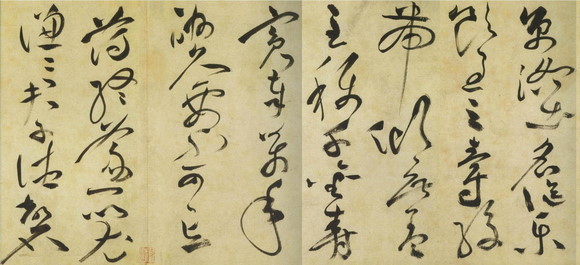
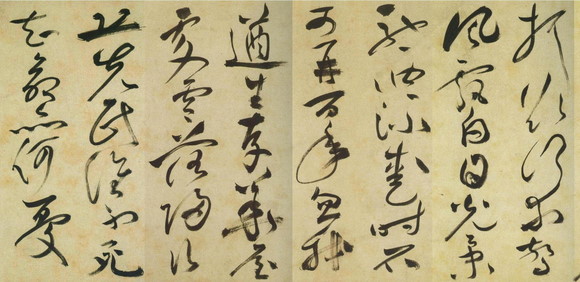
Konghouyin Cao Zhi
Place the wine in the high hall and make friends with me. The Chinese kitchen prepares sumptuous meals, cooks sheep and slaughters fattened cattle.
Qin Zheng is so generous, Qi Se is gentle and gentle. Yang'a played a wonderful dance, and Jingluo became famous.
I enjoyed drinking with the three nobles, and slowly brought shame to the common people. The host is praised for his longevity, and the guest is rewarded for thousands of years.
Don't forget it for a long time, especially for the end. A humble gentleman, what do you want from Qingzhe?
The wind blows in the daytime, and the scenery flows westward. The prosperous times will never come again, and a hundred years will pass away suddenly.
Living in a luxurious house, scattered back to the hills. Who among our ancestors will not die? How can we worry if we know our destiny?
Part Two: Overview of "Beauty Chapter"

Details of "Beauty Chapter":
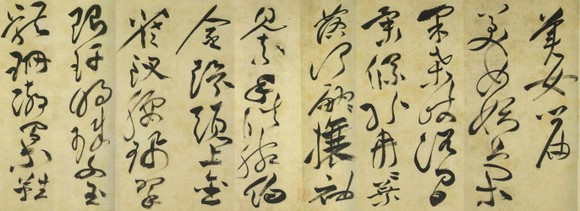
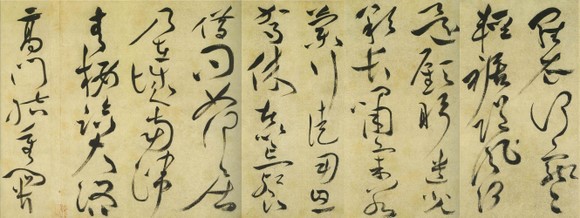
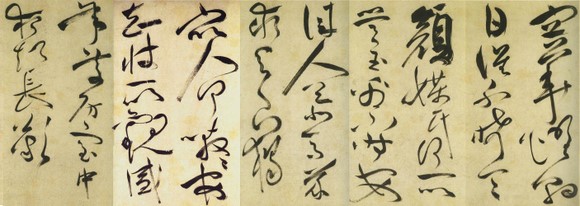
Beauty Chapter Cao Zhi
The beautiful lady is idle, picking mulberry trees on the crossroads. The soft branches are rising, and the fallen leaves are fluttering.
The bare hands are visible on the sleeves, and the bright wrists are about to have golden rings. There is a golden hairpin on the neck and a jade-colored bandana on the waist.
Pearls are intertwined with jade bodies, and corals are intertwined with trees. Luo Yi is swaying, the light skirt is returned with the wind.
Gu Pan's legacy is glorious, and his roar is like an orchid.
If you are traveling, you will need to rest. If you are resting, you will forget to eat. May I ask where my daughter is? She is at the south end of the city.
The brothel faces the main road and has a high gate with many gates. Rong Hua shines in the morning, who doesn't want to be beautiful?
Where does the matchmaker camp? Jade and silk are always safe. Beautiful women admire high righteousness, but it is difficult to find virtuous people alone.
Everyone is wailing, how do you know you are being watched? When I was in my room in my prime years, I got up in the middle of the night and sighed.
Part Three: Overview of "The White Horse"

Details of "The White Horse":
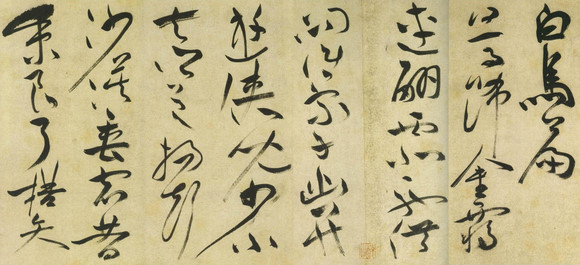
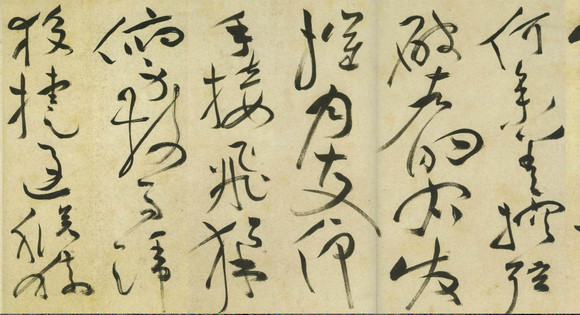
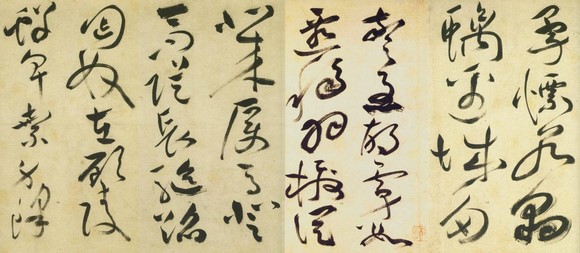
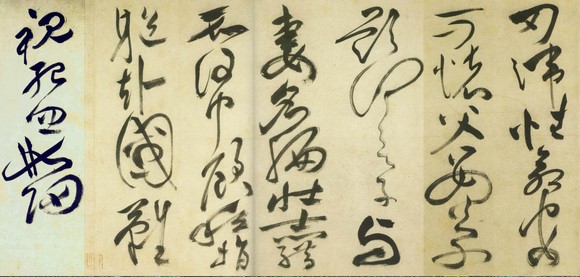
White Horse Chapter Cao Zhi
The white horse is decorated with golden restraints and gallops northwestward. May I ask who's son is You Bingyou Xia'er?
When I was young, I went to the countryside and raised my voice in the desert. In the past, there was a good bow, but the arrows were uneven.
The one who controls the string and breaks the left side will destroy the moon branch with his right hair. He raises his hand to catch the flying scorpion and bends down to scatter the horse's hooves.
He is as cunning as a monkey and as brave as a leopard. There are many policemen in the border towns, and many barbarians are migrating.
Yu Xi came from the north and rode up the high embankment. Long drive to the Xiongnu, left Gu Ling Xianbei.
Abandoning one's body at the edge of the edge, can one's life be safe? If parents don't care, how can they talk about children and wives?
When compiling the records of strong men, no selfish considerations are allowed. Sacrificing one's life to go to the country's disaster, seeing death as a sudden return home.
Part Four: Overview of "Famous Capitals"

Details of "Famous Capitals":
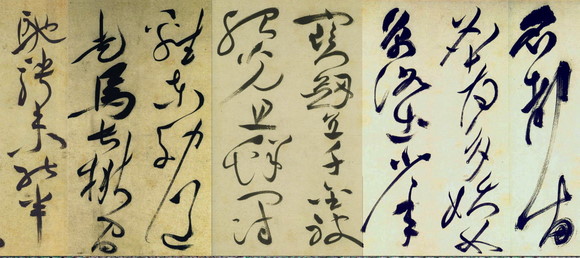
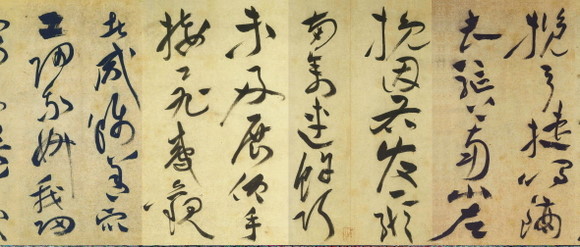
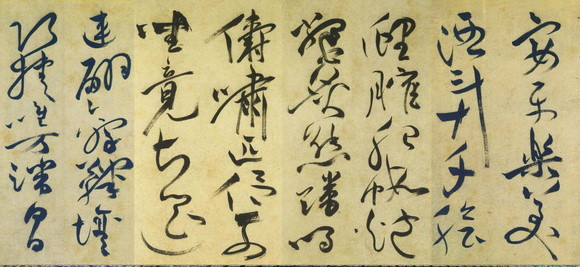
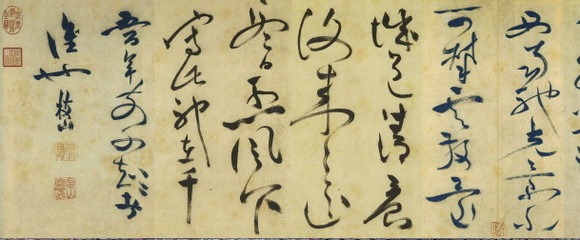
Famous Capital Chapter Cao Zhi
There are many witches in the world, and there are young men in Beijing and Luo. The sword is worth a thousand gold, and the clothes are beautiful and fresh.
On the east suburban road of Fighting Cock, you can walk between horses and catalpa trees. Halfway through the gallop, two rabbits passed me.
With the bow in hand and the sound of dysprosium, he drove up the Nanshan Mountain. The left pull is due to the right hair, and the two birds are connected in one vertical position.
Before Yu Qiao could show it, he raised his hand to catch the flying kite. Viewers praise it for its good deeds, and all the works are attributed to me.
After returning, there will be a banquet and a fight of ten thousand fine wines. The turtles and turtles are scorched and the bears are crouched.
The couple was singing and screaming, and they were sitting in rows, and the feast was going on for a long time. Continuously hitting the soil is extremely skillful and agile.
The day is running southwest, and the scenery is unattainable. The clouds dispersed and returned to the city, and they returned in the morning.
【Description of work】
Among the "Four Great Talents" who were the most influential in the cultural field of the Ming Dynasty, Zhu Yunming was recognized by the world as having the most literati qualities. "Ancient Poems in Cursive Script" was written by Zhu Yunming in his later years based on his life's insights. It contains four Yuefu poems by Cao Zhi and is a masterpiece of Zhu's cursive script. This post has the character of the European style, the majestic face, the beauty of the Chu character, and the plump character of the Yu character. Together with its bohemian character, these posts have a brilliant, innocent and indulgent character. They are the best cursive scripts rarely seen after the Tang and Song Dynasties.
Cursive calligraphy has more meaning than law, especially Dacao. It is unrestrained, open and hearty, and its composition breaks the pattern of vertical and horizontal columns. It is staggered, opening and closing, locking knots, passing and connecting, and hugging and embracing, revealing a sense of joy. A strong and shocking rhythm and rhythm, but letting loose does not mean that there are no rules, but an extraordinary courage that goes beyond the law. This kind of courage is based on mature skills and profound skills. When you sublimate to the realm of a free kingdom, you will forget both your mind and your hands in the passion of creation, and you will have random strokes, random strokes, and messy stipples. In this way, a state of lyrical and freehand brushwork is achieved, a state of "expressing wonderful principles in a bold and unrestrained spirit", a state of "doing what one wants without going beyond the rules". Throughout history, except for Er Wang, Xu Su and Huang Tingjian of the Song Dynasty, the masters of cursive script who were able to reach this level in history, the Ming Dynasty pushed cursive script to a new peak. Due to the development of the handicraft industry in the Ming Dynasty, papermaking technology became increasingly perfect, and with the hall-style architecture, the format of calligraphy began to develop significantly from small hand-rolled rulers and tablets to large scrolls in the middle, and large-scale works must have vigorous brushwork and the momentum of the eight poles. Relying on the compositional layout that contrasts strongly with the form, this creative concept constitutes the characteristics of the times when people in the Ming Dynasty were Shangshi, and the cursive script just suited the needs of this change. Ma Zonghuo's "Shu Lin Zao Jian" said: "Ming Dynasty Human beings can walk on grass, and although they are by no means well-known, they are still impressive. There were many calligraphers who were good at cursive calligraphy in the Ming Dynasty. The famous ones include Chen Bi, Zhang Bi, Wen Zhengming, Wen Peng, Wang Chong, Chen Daofu, Mo Yunqing, Dong Qichang, Chen Jiru, Huang Daozhou, Zhang Ruitu, Ni Yuanlu, Fu Shan, Wang Duo and others, each of them galloped in this broad field and formed different styles. Among them, the most famous one is Zhu Yunming.
Zhu Yunming's regular script benefited from Li Yingzhen's guidance, and he acquired the bones of the European character, the hero of the Yan Kai script, the beauty of the Chu character, and the plump character of the Yu character. He was especially good at small regular script, directly following the wishes of the Wei and Jin people, and thus laid a solid foundation at a young age. Once the regular script is established, the overflow into cursive script is naturally impressive. Coupled with his unruly personality, he has a special liking for cursive script. His cursive script is mainly under the guidance of Xu Youzhen. From Xu Su, he can be traced back to the second king, who was middle-aged. From then on, his writing became more and more extensive. From King Zhong of the Wei and Jin Dynasties to Zhao Mengfu of the Yuan Dynasty, all his writing skills were at an end. Therefore, in his later years, his writings changed unpredictably, with a brilliant character and a naive and unrestrained style. Judging from his cursive writing works handed down, they have different faces. Different, there are single grasses that have no form but full energy, modern grasses that are like flowing clouds and flowing water, and there are wild grasses that are unrestrained and vigorous. No matter what form of cursive script, they are written in an open and relaxed way, with ups and downs, strong penmanship, and messy stipples. It seems chaotic, but it is not chaotic. It seems scattered, but the energy is concentrated. It is not scrawled due to randomness. Every stroke can be broken and then come back. You can see the dots in the movement, so when you look at it from the whole frame, it looks energetic and bold. . Commenting on Zhu Yunming's book in "Yi Yuan Yan" by Wang Shizhen, he said: "The changes in the late festival are unpredictable, and the character is brilliant and innocent." 』This post is worthy of it.
【About the Author】
Zhu Yunming (1460-1527) was a calligrapher of the Ming Dynasty. His courtesy name was Xizhe and his nickname was Zhishan. Because his right hand had six fingers, he named himself "Zhizhisheng" and was also named Zhishan Laoqiao, Zhizhishan people, etc. Han nationality, from Cheung Chau. He is well-educated in his family, capable of poetry, calligraphy, and calligraphy. Especially his cursive calligraphy is highly praised by the world. It is said that "Tang Bohu's paintings and Zhu Zhishan's calligraphy " are popular. Zhu Zhishan's "Poetry and Fu Volume in Six-Style Script", "Du Fu's Poetry Volume in Cursive Script", "Nineteen Ancient Poems", "Poetry Volume of Tang Dynasty in Cursive Script" and "Poetry and Han Volume in Cursive Script" are all masterpieces handed down from generation to generation. He is as famous as Tang Yin, Wen Zhengming and Xu Zhenqing. Mingli called him one of the "Four Talents in Wuzhong".

